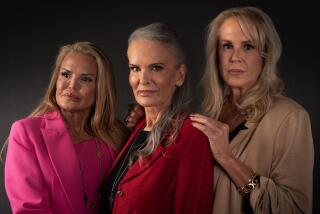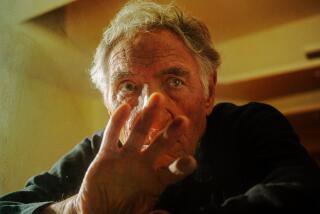He’s Still Spreading Sunshine and Doing It With Style
- Share via
Fayard Nicholas was too busy dancing to get the connection.
Nicholas dances even when he is sitting down, punctuating his speaking voice, sort of an undulating tenor, by sliding an arm or leg to the left or right, whether or not a point needs to be made.
On a recent misty evening, he and his wife, Barbara, were on their way out to the New Year’s celebration of the Bahai faith, to which they both belong.
So why would the 78-year-old former vaudevillian and Hollywood tap-dancer--who lives at the Motion Picture & Television Fund retirement community in Woodland Hills--care to stay in, just to watch “The Sunshine Boys” at the community’s theater?
Not that the young doctor from UCLA and the film critic he’d brought along to discuss images of aging in film didn’t mean well.
As certified experts on growing old, they and the evening’s other organizers really thought that the retired movie and TV people who live at the sprawling Woodland Hills facility would show up to watch Walter Matthau--who played a 78-year-old former vaudevillian in the 1975 film--shout himself into a heart attack.
That would be followed, they figured, by a lively discussion of what Dr. David Reuben, the geriatrician, called the film’s “fine portrayal” of old age.
Only the real Sunshine Boys and Girls who were supposed to be in the audience must have had better things to do.
The plates of cookies outside the community’s plush Louis B. Mayer Theater were piled high, uneaten. The big bowl of lemonade remained full.
The sky darkened with impending rain and two visitors from UCLA, tired of poking at the food, decided to move inside.
They found an audience of six, mostly staff members of no notably advanced age, certainly not of a generation that remembered, much less danced in, vaudeville. Linda Lee, who handles public relations for the UCLA Center on Aging, and Reuben, who helped plan the evening and was to speak afterward, made eight.
“Bingo,” a red-haired woman seated near the back offered helpfully. “It’s a big competitor around here.”
Out in the lobby, Nicholas, wearing a white jacket, red shirt with a blue collar, black pants and white tasseled loafers, held court.
A Tony-winning choreographer who danced with his brother, Harold, in New York’s famed Cotton Club and a raft of Hollywood movies, he tapped and glided and swayed his way through the story of his life.
The Nicholas Boys, as they were known, started out in 1926 as the Nicholas Kids, he said, dancing as a trio in Philadelphia until sister Dorothy, who never liked working nights, dropped out.
Their parents quit working as musicians to manage the young hoofers, who were soon closing the show at the Cotton Club, dancing to the music of Cab Calloway, Duke Ellington and others.
Wherever they played, he said, they stole the show. They were so hot that other performers refused to go on after them.
“Remember the Beatles here, how they were waiting for them at the airport?” he said. “When we went to Europe, that’s how they waited for us. In 1948, we danced for the King and Queen of England.”
He and Barbara had moved here, to a two-bedroom cottage on the center’s landscaped grounds, seven years ago from West Hollywood.
The community bent the rules to let them in, he said, because Barbara, who married Fayard 25 years ago when he was 53, was too young--they won’t say how young--to meet the age 65 requirement for residency. Brother Harold, who at 73 is still working, lives in New York City with his girlfriend.
Fayard Nicholas doesn’t relate to “The Sunshine Boys” though, except to wonder out loud why his friend, Jack Finney, who played cantankerous Willie Clark in the Broadway production of the Neil Simon play on which the film was based, lost out to Matthau for the movie role.
And it’s a small wonder, really.
In the film, Matthau and George Burns play Clark and Al Lewis, septuagenarian comedians from the days of vaudeville who performed under the name Lewis and Clark. Lewis leaves their act to retire, and Clark never forgives him.
The film’s action begins 11 years later, when the pair--whose relationship has turned destructive under the weight of Clark’s anger--are united to perform in a television special on the golden age of American comedy.
And while Nicholas prepared for an evening of feasting and entertainment with fellow Bahaists, the screen inside reverberated with Clark’s fury--at Lewis, at the debilitations of age, at his declining abilities.
After the film ended, Reuben spoke to the small gathering about dementia, Alzheimer’s disease and heart attacks--the end-game miseries that are the stuff of his trade--and answered a few polite questions.
Outside, Nicholas beamed and talked about his granddaughters. At 4 and 6 years old, they study at Paul Kennedy’s Universal Dance Theater in Los Angeles and have already begun to perform together. Last year, they joined their grandfather on stage in a revue--two little girls tap-dancing in the very same theater that this night showed the two old comics in “The Sunshine Boys.”
“The Nicholas Sisters,” he said proudly. “They stole the show.”
More to Read
Only good movies
Get the Indie Focus newsletter, Mark Olsen's weekly guide to the world of cinema.
You may occasionally receive promotional content from the Los Angeles Times.










